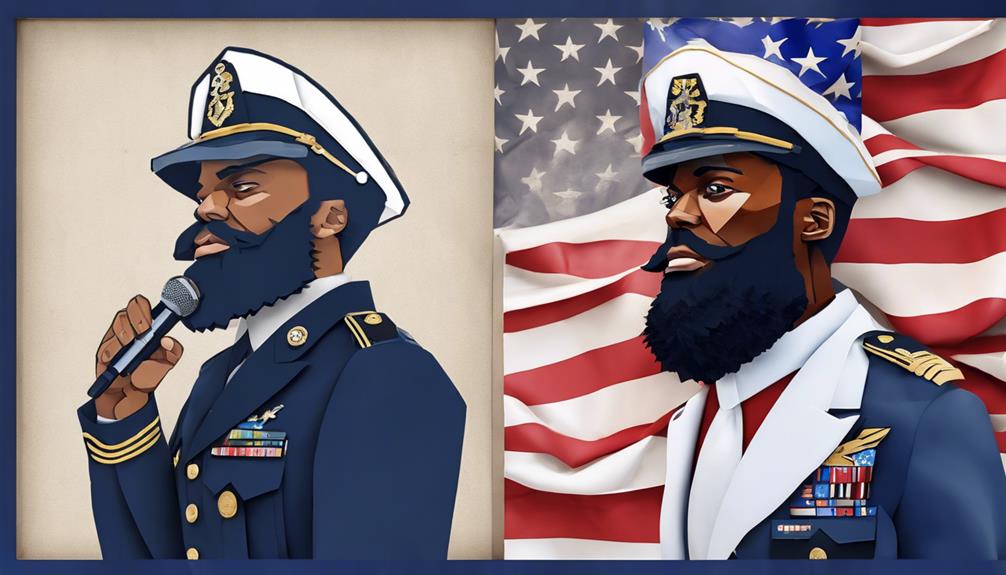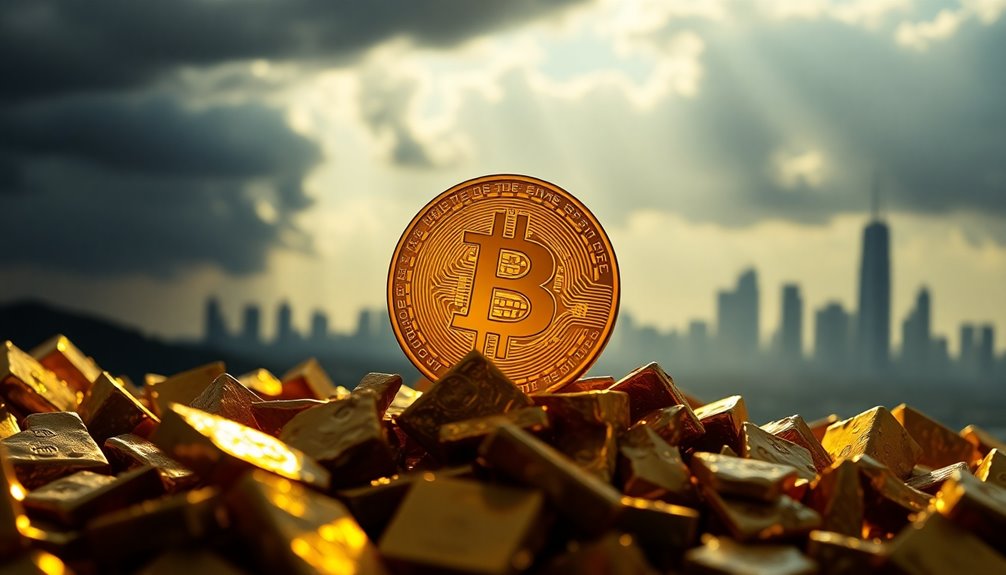You've wondered what makes a speech truly unforgettable. From Martin Luther King Jr.'s 'I Have a Dream' to Eleanor Roosevelt's advocacy for human rights, some speeches have changed the course of history. Nelson Mandela's condemnation of apartheid, Susan B. Anthony's fight for women's suffrage, and Harvey Milk's plea for LGBTQ+ rights are just a few examples. These iconic speeches have inspired generations to challenge oppression, advocate for equality, and work towards a better world. As you explore the world of influential speeches, you'll discover how these powerful words have shaped humanity's journey towards freedom, justice, and unity – and what's still to come.
Key Takeaways
- Iconic speeches like Martin Luther King Jr.'s 'I Have a Dream' and Winston Churchill's 'We Shall Fight on the Beaches' have shaped history and inspired change.
- Leaders like Nelson Mandela, Malala Yousafzai, and Susan B. Anthony have defied oppression and advocated for human rights and equality through powerful speeches.
- Influential speeches have sparked collective action, such as Gandhi's Quit India Speech and Mandela's Rivonia Trial speech, leading to significant social and political changes.
- Defining moments in history, like John F. Kennedy's inaugural address and Queen Elizabeth II's Tilbury speech, have altered the course of human events and inspired future generations.
- Passionate pleas for equality, such as Harvey Milk's 'Hope' speech and Malala Yousafzai's UN address, have championed marginalized groups and empowered them to demand justice and equality.
Speeches of Freedom and Justice
Throughout history, iconic speeches have ignited a fire for freedom and justice, inspiring generations to work towards a more equal and just society. You might recall Martin Luther King's powerful 'I Have a Dream' speech, which advocated for racial equality and civil rights, becoming a defining moment in the American civil rights movement. King's words continue to inspire you to work towards a more just society.
Eleanor Roosevelt's 'The Struggle for Human Rights' speech emphasized the importance of universal human rights and social justice. Her words left a lasting impact on global human rights advocacy, encouraging you to fight for the rights of all individuals.
These iconic speeches have shaped the course of history, pushing for a world where everyone is treated with dignity and respect. By advocating for human rights, these leaders have inspired you to stand up against injustice and fight for a more equitable world.
Their powerful words have ignited a fire within you, inspiring you to become a champion of freedom and justice.
Voices Against Oppression
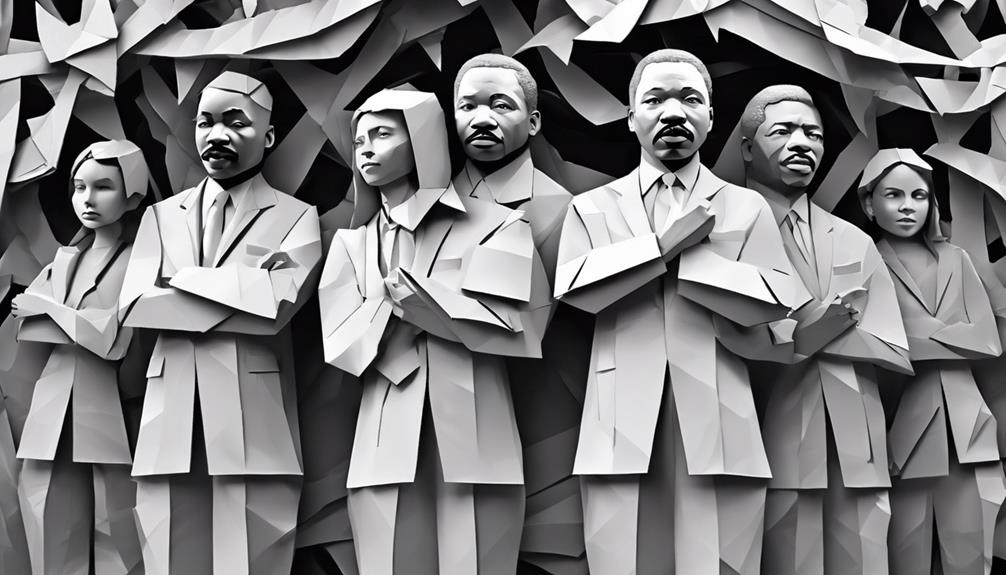
As you explore the powerful voices that have stood against oppression, you'll discover three key themes that emerge:
Breaking the Chains, Unheard Voices Rise, and Against the Tyrant.
These points will guide you through the courageous speeches that have shaped history, from Nelson Mandela's defiance against apartheid to Malala Yousafzai's advocacy for girls' education.
Breaking the Chains
Through the power of their voices, courageous individuals have shattered the chains of oppression, igniting flames of resistance that continue to inspire and empower generations to fight for equality and justice.
In the American civil rights movement, voices like Nelson Mandela's echoed loud and clear, refusing to be silenced by apartheid. His Rivonia Trial speech in 1964 still resonates, a beacon of hope in the face of racial segregation.
Similarly, Malala Yousafzai's UN address championed girls' education, defying terrorism and inspiring youth globally. Susan B. Anthony's 'On Women's Right to Vote' speech demanded equality, paving the way for women's suffrage movements.
Harvey Milk's 'Hope' speech advocated for LGBTQ+ rights, becoming an icon for the community. Emmeline Pankhurst's 'Freedom or Death' speech fought for women's suffrage in the UK, sparking civil disobedience in the suffragette movement.
These voices, and many more, have broken the chains of oppression, shaping a world where equality and justice are within reach.
Unheard Voices Rise
You stand on the shoulders of giants, inspired by the courage of those who broke the chains of oppression, and now it's time to amplify the voices that refused to be silenced.
The unheard voices rise, and their great speeches echo through history, challenging the status quo and fighting for change.
Malala Yousafzai's UN Address advocated for girls' education and stood against terrorism, showcasing the power of a young voice against oppression.
Harvey Milk's 'Hope' Speech championed LGBTQ+ rights and resilience, inspiring a marginalized community to rise against discrimination.
Emmeline Pankhurst's 'Freedom or Death' Speech demanded equality and justice for women, sparking civil disobedience in the suffragette movement.
Susan B. Anthony's 'On Women's Right to Vote' Speech fought for women's suffrage and challenged gender inequality, paving the way for women's rights movements.
Eleanor Roosevelt's 'The Struggle for Human Rights' Speech promoted universal human rights and social justice, advocating for dignity and equality in the face of oppression.
These voices, once silenced, now rise to inspire and empower generations to come.
Against the Tyrant
When confronting oppression, voices of courage rise to challenge the tyrant, echoing through history as beacons of hope and defiance. You've heard the names: Mahatma Gandhi, Nelson Mandela, Martin Luther King Jr., Susan B. Anthony, and Eleanor Roosevelt. Their speeches against oppression sparked movements that changed the course of history.
Gandhi's words inspired Indians to resist British colonial rule, ultimately leading to India's independence in 1947. Mandela's speeches condemned apartheid in South Africa, paving the way for his presidency and the end of racial segregation. King's advocacy for civil rights and equality influenced key legislation and challenged segregation in the United States. Anthony's fight for women's suffrage laid the groundwork for gender equality movements and secured women's right to vote. Roosevelt's human rights speeches at the UN contributed to the Universal Declaration of Human Rights, shaping global constitutions.
These voices against oppression fought for fundamental rights, often in the face of war or violent resistance. Their courage in the face of adversity inspires us to stand up against injustice, echoing through history as beacons of hope and defiance.
Calls to Action for Humanity
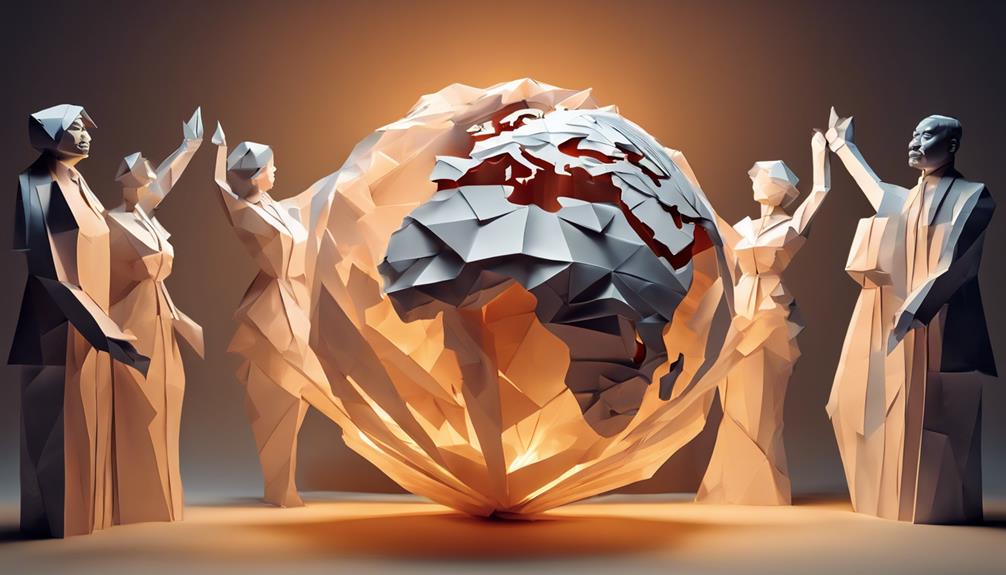
As humanity stands at the crossroads of progress and injustice, iconic voices have risen to challenge the status quo, inspiring collective action to shape a better future.
You've likely heard of Martin Luther King Jr.'s powerful 'I Have a Dream' speech, which played a significant role in the US civil rights movement. However, there are several other influential speeches that have changed the course of human history.
Here are a few examples:
- Mahatma Gandhi's Quit India Speeches in 1942 sparked India's struggle for independence through passive resistance.
- Nelson Mandela's Rivonia Trial speech in 1964 inspired the fight against apartheid in South Africa.
- Eleanor Roosevelt's Address to the United Nations on Human Rights led to the drafting of the Universal Declaration of Human Rights.
- Although Queen Elizabeth II's speeches are often more formal and diplomatic, they still play an essential role in promoting unity and cooperation among nations.
These speeches demonstrate the power of words to inspire and mobilize people to work towards a common goal. They remind us that, even in the face of adversity, our collective actions can bring about significant positive change.
Defining Moments in History

Beyond the calls to action that have inspired humanity, there exist pivotal moments in history where a single speech has altered the trajectory of a nation, forever changing the course of human events. You may recall Martin Luther King Jr.'s iconic speech, 'I Have a Dream,' which ignited the American civil rights movement. Similarly, Winston Churchill's 'We Shall Fight on the Beaches' speech rallied Britain during World War II, emphasizing perseverance against Nazi Germany.
| Speaker | Speech Title | Historical Context |
|---|---|---|
| Martin Luther King Jr. | I Have a Dream | American Civil Rights Movement |
| Winston Churchill | We Shall Fight on the Beaches | World War II |
| John F. Kennedy | Ask Not What Your Country Can Do for You | Inaugural Address |
| Nelson Mandela | I Am Prepared to Die | Rivonia Trial |
These defining moments in history have had a profound impact on the world, shaping the course of human events. You can see how these speeches have inspired change, from fighting for racial equality to rallying against oppressive regimes. These moments have left an indelible mark on history, forever changing the world as we perceive it.
Words That Shaped the Future

Throughout history, speeches have consistently played a pivotal role in shaping the future, with charismatic leaders using their words to inspire, motivate, and drive change. You've likely heard of some of the most iconic speeches that have changed the course of human history. But which ones have had the most significant impact?
Some of the most notable speeches that have shaped the future include:
- Queen Elizabeth I's Tilbury speech, which boosted English morale during the Spain vs. England rivalry, leading to victory.
- Patrick Henry's 'Give Me Liberty or Give Me Death' speech, which inspired Virginia's role in the Revolutionary War, influencing key figures.
- Mahatma Gandhi's Quit India Speeches, which symbolized India's struggle for independence through passive resistance, culminating in freedom in 1947.
- Eleanor Roosevelt's Address to the United Nations on the Universal Declaration of Human Rights, which influenced national constitutions globally as the most translated document.
These speeches have left a lasting impact on world history, shaping the course of nations and inspiring generations to come.
Leaders of Social Change
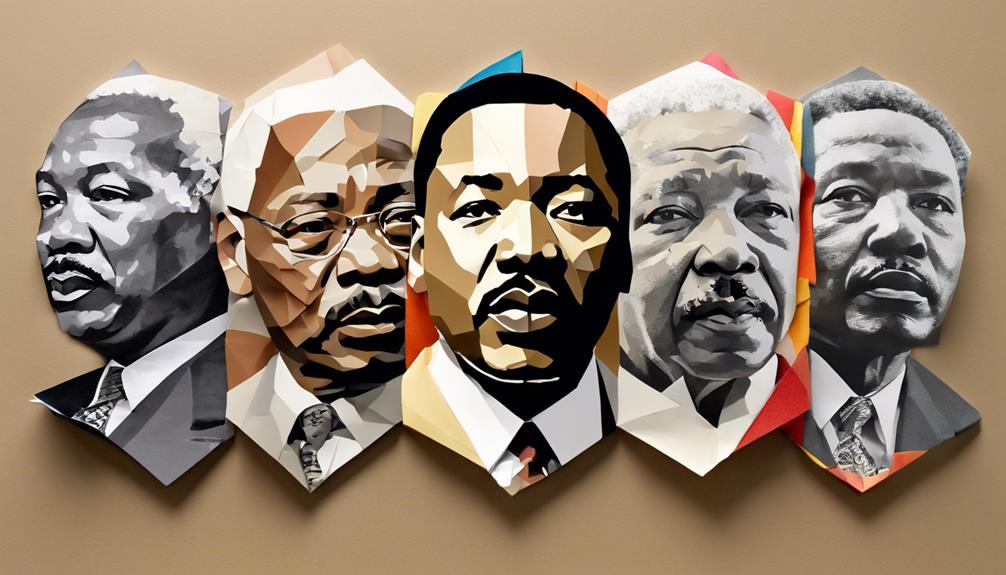
From Martin Luther King Jr.'s impassioned call for racial equality to Nelson Mandela's defiant stance against apartheid, leaders of social change have harnessed the power of oratory to challenge the status quo and inspire transformative action.
You're likely familiar with King's iconic 'I Have a Dream' speech, which ignited the American Civil Rights Movement and continues to resonate today. Similarly, Mandela's 'I Am Prepared to Die' speech symbolized his unwavering resistance against apartheid in South Africa, paving the way for a more equitable future.
These trailblazers, along with others like Susan B. Anthony, Harvey Milk, and Emmeline Pankhurst, have employed their eloquence to galvanize movements and reshape the social landscape. Their speeches not only reflected the spirit of their times but also helped shape the course of history.
As you explore the world of influential speeches, you'll discover how these leaders of social change have employed their rhetorical prowess to challenge injustices, advocate for human rights, and inspire generations to work towards a better tomorrow.
Passionate Pleas for Equality
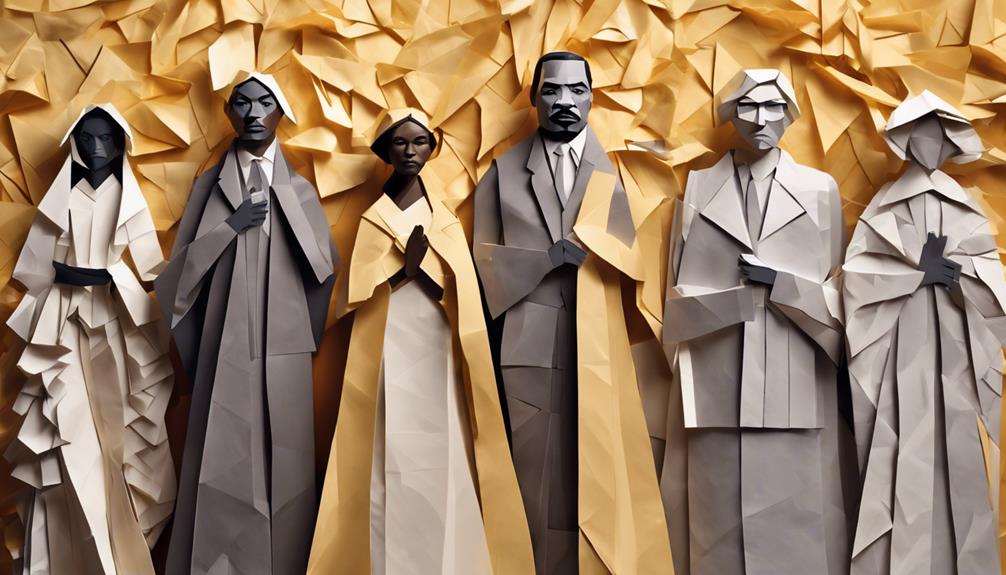
As you explore the world of passionate pleas for equality, you'll discover that some of the most iconic speeches in history have been fueled by a burning desire to challenge injustices and advocate for human rights. These rousing speeches have inspired generations to fight for a more just and equitable society.
Some of the most notable examples include:
- Martin Luther King Jr.'s 'I Have a Dream' speech, which called for an end to racial discrimination and inspired the civil rights movement.
- Susan B. Anthony's 'On Women's Right to Vote' speech, which demanded voting rights for women and challenged gender inequality.
- Malala Yousafzai's UN address, which advocated for girls' education and human rights, empowering youth to make a difference.
- Harvey Milk's 'Hope' speech, which championed LGBTQ+ rights and equality, becoming an icon for the LGBTQ+ community.
These passionate pleas for equality have changed the course of history, inspiring movements and shaping the world we live in today. They remind us that the power of words can spark meaningful change and create a more just and equitable society.
Iconic Addresses to Nations
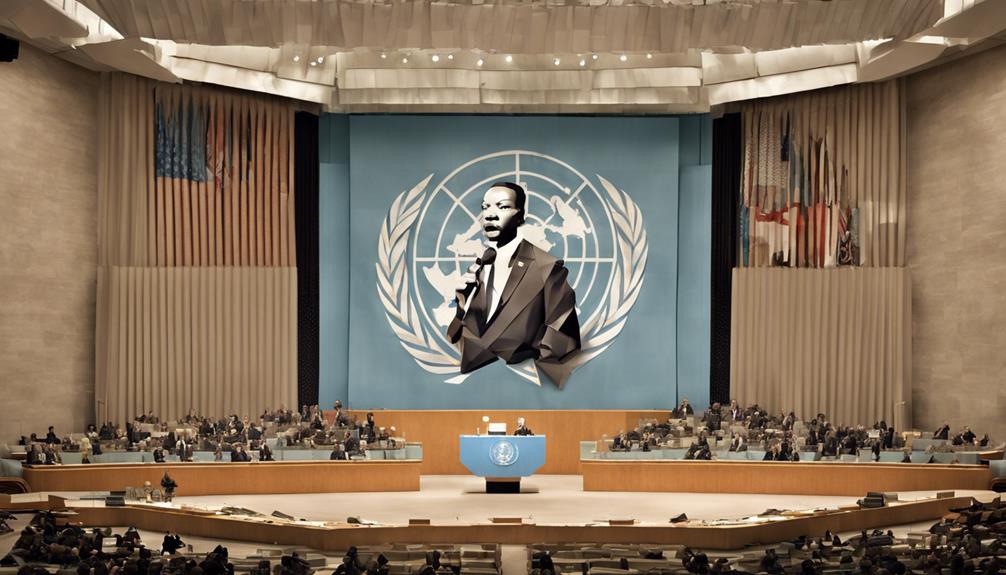
As you explore iconic addresses to nations, you'll discover how influential leaders have shaped the course of history with their words.
You'll examine speeches like John F. Kennedy's Cuban Crisis Call, where he addressed the nation during a time of uncertainty, and Franklin D. Roosevelt's Fireside Chats, which offered comfort and guidance during the Great Depression.
These speeches demonstrate the power of oratory skills in times of crisis and uncertainty.
Kennedy's Cuban Crisis Call
You're witnessing a pivotal moment in history when, on October 22, 1962, President John F. Kennedy took to the airwaves to address a nation teetering on the brink of nuclear war, his words hanging precariously in the balance between calm and catastrophe. This was no ordinary speech – it was a Cuban Crisis Call, a televised address that would change the course of history.
Kennedy's speech was a masterclass in leadership, urging Soviet Premier Khrushchev to remove missiles from Cuba to avoid nuclear war. The Cold War standoff was at its most tense, and Kennedy's words were a beacon of hope in a time of uncertainty.
Here are some key takeaways from Kennedy's iconic address:
- The speech was a defining moment in the Cuban Missile Crisis, marking a turning point in the Cold War.
- Kennedy's strong leadership and communication skills helped defuse the situation, avoiding nuclear war.
- The address showcased Kennedy's ability to remain calm under pressure, even in the face of catastrophic consequences.
- The Cuban Crisis Call is remembered as one of the most iconic addresses to a nation in times of crisis.
Roosevelt's Fireside Chats
Thirty evenings, Franklin D. Roosevelt gathered Americans around their radios to deliver reassuring words of hope and guidance, forging an unshakeable bond between the President and the people.
Through his iconic Roosevelt's Fireside Chats, President Franklin D. Roosevelt connected with the nation, addressing pressing concerns and explaining complex policies in a conversational tone. You felt like he was speaking directly to you, making the issues more relatable and accessible.
These 30 evening radio addresses, delivered during the Great Depression and World War II, helped build trust and unity among Americans. Roosevelt's Fireside Chats played a significant role in shaping public opinion and garnering support for his policies.
Courageous Voices for Reform
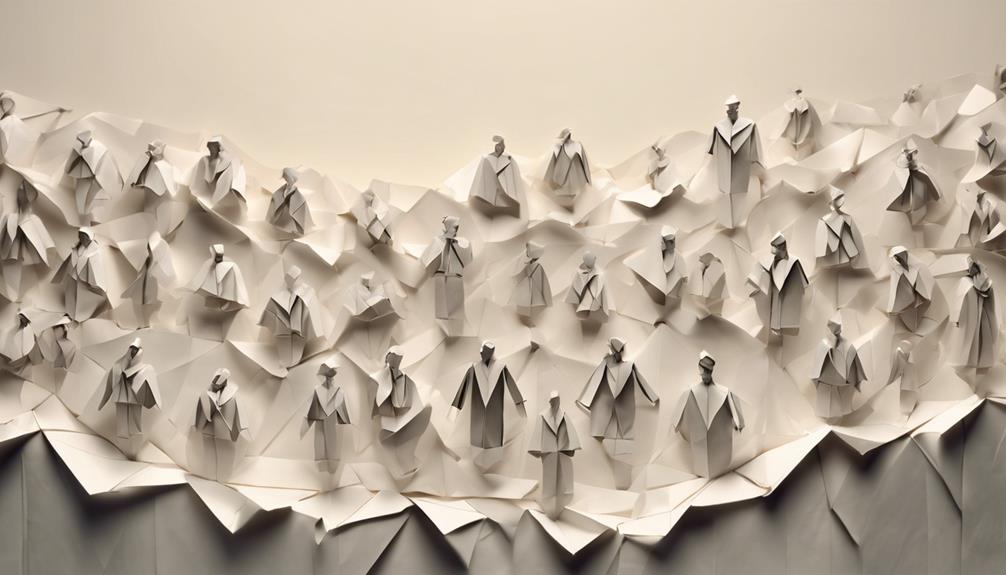
Throughout history, courageous voices have risen to challenge the status quo, demanding reform and inspiring generations to take action. You may have heard of some of these iconic speeches that have changed the world.
Some remarkable examples include:
Susan B. Anthony's 'On Women's Right to Vote' speech, which demanded voting rights for women and challenged gender inequality.
Malala Yousafzai's UN address, which advocated for girls' education and stood against terrorism, empowering youth to make a difference.
Harvey Milk's 'Hope' speech, which championed LGBTQ+ rights, encouraged hope and resilience, and fought against discrimination.
Emmeline Pankhurst's 'Freedom or Death' speech, which inspired civil disobedience and demanded equality and justice for women's suffrage.
These courageous voices shall fight for what's right, inspiring you to take action and make a difference. Their speeches have left a lasting impact, shaping the course of history and paving the way for a more just and equal society.
Timeless Messages of Hope

Rallying cries for freedom, equality, and unity have echoed throughout history, motivating generations to pursue a better tomorrow.
You've likely heard Martin Luther King Jr.'s iconic words, 'I have a dream that one day this nation will rise up and live out the true meaning of its creed: 'We hold these truths to be self-evident, that all men are created equal.'' His speech inspired hope for racial equality and unity in the United States.
Similarly, Winston Churchill's 'We Shall Fight on the Beaches' speech rallied British resolve during World War II, while John F. Kennedy's 'Ask Not What Your Country Can Do for You' speech emphasized public service and unity.
Nelson Mandela's 'I Am Prepared to Die' speech highlighted his dedication to fighting against apartheid in South Africa, advocating for freedom and equality. These timeless messages of hope have left an indelible mark on history, inspiring future generations to endeavor for a better world.
Frequently Asked Questions
What Famous Speech Changed the World?
You're wondering what famous speech changed the world? Well, it's likely one of several iconic speeches, such as Martin Luther King Jr.'s "I Have a Dream" or Winston Churchill's "We Shall Fight on the Beaches" that left a lasting impact.
What Is the Most Influential Speech in the World?
You're wondering what the most influential speech in the world is, right? The answer's not so clear-cut, but imagine a speech that sparked a movement, inspired a nation, and reshaped the course of history – that's what you're looking for.
What Was the Greatest Speech in History?
You ponder the greatest speech in history, weighing options like Martin Luther King Jr.'s "I Have a Dream" or Winston Churchill's "We Shall Fight on the Beaches" – each iconic in its own right, but which one takes the top spot?
What Is the Most Inspirational Speech of All Time?
You're wondering what the most inspirational speech of all time is. While opinions vary, Martin Luther King Jr.'s 'I Have a Dream' speech resonates deeply, inspiring generations with its powerful message of racial equality and unity.
How Have Christian Speakers’ Speeches Changed the World?
Throughout history, inspiring famous christian speakers have been instrumental in shaping the world with their powerful speeches. Their message of love, hope, and faith has touched the lives of millions and played a significant role in driving social change, promoting unity, and spreading kindness and compassion.
Conclusion
You've witnessed the most memorable speeches that have changed the world. Remember, 'well-behaved women seldom make history' – and the same goes for men.
These courageous individuals refused to be silenced, inspiring generations to fight for freedom, justice, and equality. Their words continue to resonate, a proof of the power of speech to shape our collective future.
As you reflect on these iconic addresses, remember that one voice can spark a revolution, and yours can be the next to make a difference.


